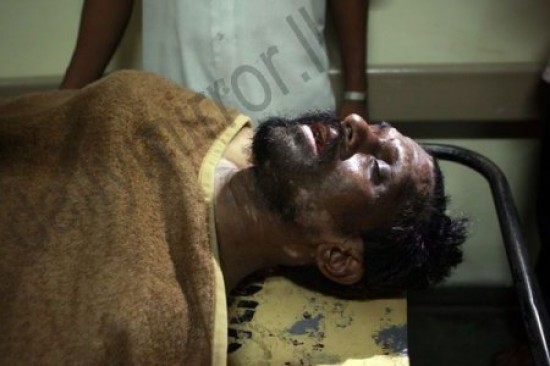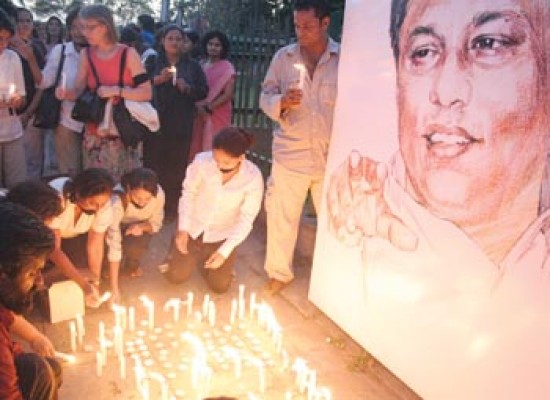Killing fields of Weliweriya -not the first and won’t be the last
“The object of terrorism is terrorism. The object of oppression is oppression. The object of torture is torture. The object of murder is murder. The object of power is power. Now do you begin to understand me?”
― George Orwell,
Government sponsored intimidation
In my column on Sunday, October 14, 2012 I commenced thus: “Government-sponsored intimidation of leading members of the bureaucracy, judiciary and the media is not a new phenomenon. Its history could be traced to as far
back as the fifties, yet for our conversation, let us begin with the seventies. A remarkable increase in the Government-sponsored intimidation, harassment and even murder has occurred during the last four decades. This mode of government conduct may not be limited to intimidation and harassment directly perpetrated by the security forces such as the Police and members of the three armed forces of the Government. More often than not, the intimidation has been committed by either civilians or personnel of the police and other security forces in their civil personalities and clad in civil.”
Unarmed civilians
In that piece, my focus was on the bureaucracy, judiciary and the media in the country. I deliberately kept out the ordinary civilians who are being subjected to state-sponsored intimidation and harassment by the same culprits on an on-going basis. The random acts of intimidation, harassment, threats and even murder are aplenty and taking place on a very consistent basis. Exactly ten months after that day of my column, allow me to include ‘unarmed civilians’ in the growing list of those unfortunate victims of state-sponsored terrorism and intimidation.
Government’s desperation
When that state-sponsored intimidation, terrorism and harassment is aimed at an organized group of protesters who, as a cohesive group with one slogan, one demand and one voice, decided to exercise their fundamental rights of freedom of speech and freedom of movement in a march in an otherwise peaceful and docile neighborhood, the civilians received the blows of clubs and bayonets and the thunder of live bullets and gunfire. The Government’s desperation is fully exposed and their reluctance to adopt more democratic and decent mechanisms of conflict-resolution is bared open. When television cameras and hand-phones, the modern amenities of communication, began clicking the terror unleashed by the paid soldiers who are a disgrace to the uniform they wear, the painting assumed a totally different shade which is in character and style could be described only as inexplicable and chilling.
Not just an excess of war
The Weliweriya massacre was not just an ‘excess of war’, nor was it an impromptu reaction to a civil-disobedience organized by a group of harmless villagers whose only demand was for cleaner water. It was organized and orchestrated by willful command and executed with military ruthlessness. Nedungamuwa, three miles from Weliweriya, is a lazy-looking hamlet situated in the Gampaha district. ‘Dipped Products’, a glove-making factory is a subsidiary of Hayleys Group of Companies. Hayleys’ big boss is the Secretary to the Ministry of Transport and he also owns a chain of leading casinos in Colombo providing evening entertainment to the warped minds and starved souls of those who indulge in gambling and sex. Now this factory of Hayleys is being accused of causing the contamination of the ground water in the Weliweriya area.
The big boss
The big-boss is reputed to be a very God-fearing, religious gentleman, organizing even his daily routine in accordance with the behavior of extra celestial bodies, reaching the ends of extremity by refraining from doing any
activities, mundane or otherwise, during the ‘Rahu period’ (period of the planet Rahu), wearing only one colored necktie (red), so it is believed that his material benefits would multiply by the hour and the day. Whether his material wealth is solely due to the miracles performed by the ‘gods’ he has chosen to worship is another matter altogether, but he must realize that the innocent villagers of Nedungamuwa and Weliweriya are no less religious and perhaps worship the same ‘gods’ whose blessings he most consistently invokes. It is also common knowledge that his proximity to the ‘real powers’ that be in the country is even more significant a factor and it is the defense that he has built around himself in his recent rise to fame and celebrity-status.
“May I be deprived of heaven, of life, and of offspring if I oppress you.”
But if one finds the defenseless denizens of ‘Siyane Korale’ less important in the game of power politics, then the story changes, every chapter and verse. In this instance it is pertinent to quote from “The Discovery of India”, Jawaharlal Nehru’s famous book, wherein he outlines the crux of the “Arthashasthra”, the first written word on political science authored by Emperor Chandragupta’s Chief Advisor and mentor, Chanakya: “The king, at the time of his coronation, had to take the oath of service to the people- “May I be deprived of heaven, of life, and of offspring if I oppress you.” “In the happiness of his subjects lies his happiness; in their welfare, whatever pleases himself he shall consider as not good, but whatever pleases his subjects, he shall consider as good. If a king is energetic, his subjects will be equally energetic. Public work could not suffer or await king’s pleasure; he had always to be ready for it. And if the king misbehaved, his people had the right to remove him and put anther in his place.”(Page 117, The Discovery of India by Jawaharlal Nehru)
Failed states
We unfortunately don’t have Nehrus or Chanakyas in our midst today; yet the absence of reasonable men and women is greatly felt, especially in the context of governance and statecraft. Handing the most lucrative and pivotal government billets of those who contributed to the kitty of the election campaigns and harassing and threatening the journalists who expose such nefarious deeds is the type of governance that one finds in most of the failed states in the Twentieth and Twenty First centuries. Pakistan, Uganda, Myanmar, Libya, Syria and Iraq are but a few
examples of such failed states where the people are treated as spectators although they are in fact the electors of those very leaders who turn their back to the mandate given unto them and choose to oppress the very source of the power they wield today. This unmerciful power-game has been going on for the last two or three decades without any checkmating from any quarter in this country and what is most accountable for such a degeneration of values and systems is the people themselves who are led by a politically impotent opposition.
Grisly killings
In the annals of state-oppression, Weliweriya does not occupy, I repeat, does not occupy a special place. In the
course of state-suppression, in the eyes of those who control power, it is just another minor incident wherein a ‘gang of hooligans’ led by politically-motivated trouble makers. However, the loss of life, disturbance to peaceful existence, anxiety for the injured and fear of a repetition would play a very significant part in the hearts and minds of those who witnessed the grisly killings in Weliweriya on August 1, 2013.
Weliweriya not the first of its kind and with the Rajapaksas won’t be the last
But in the context of the following acts committed in this land of the Buddha, namely: the murder of Lasantha Wickrematunga, the editor of the Sunday Leader, in broad daylight, disappearance of Prageeth Ekneligoda, journalist, disappearance of Lalith Kumar Weeraraj and Kugan Muruganathan, human rights activists, tying up of a Grama Niladhari by Mervyn Silva, Minister of Public Relations, attack on journalist Poddala Jayantha and Mervyn Silva’s open boast and threat to other journalists that he would mete out to them the same treatment meted out to Poddala Jayantha, Bharatha Lakshman’s murder, once again in broad daylight and with the main accused being treated in a foreign hospital who is claiming amnesia as to the incidents of the day, Mervyn Silva’s son Malaka Silva attacking an Army Major and getting away with the Army Major now suffering a bout of amnesia and the Attack on the Secretary to the Judicial Services Commission stand out as monuments to the suppressive nature of the governing circles and remind us that Weliweriya incident is not the first of its kind and most definitely won’t’ be the last.



